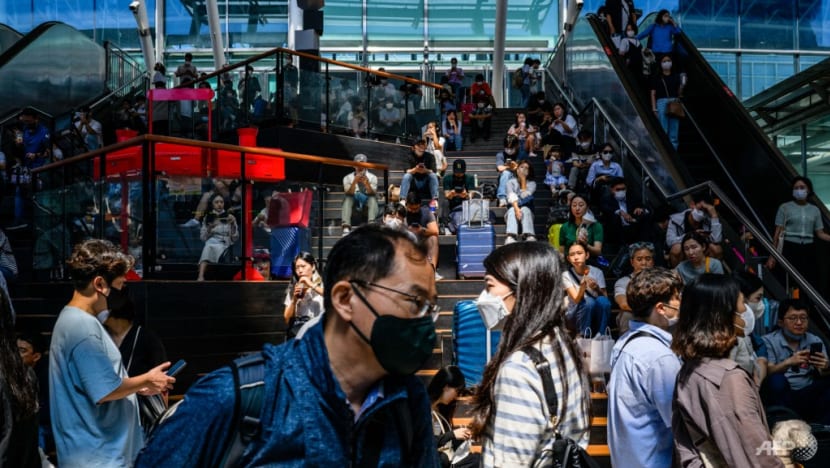Commentary: Lessons in preparing for war on the Korean peninsula
As Kim Jong Un ratchets up his nuclear arsenal, Seoul residents face questions over how to plan for a crisis, says Financial Times' Christian Davies.

File photo. Passengers gather in a train station as South Korea marks the annual Chuseok festival holiday, at Seoul station on Sep 29, 2020. (Photo: AFP/Anthony Wallace)
SEOUL: Feigning as much detachment as I could, I once asked a Western diplomat over lunch what arrangements various countries had for evacuating their citizens in the event of a conflict on the Korean peninsula.
I shouldn’t worry about it, they said. The firepower of the respective adversaries is so great, and the distances between them so small, that it - and I - would all be over before I even knew it had begun.
So when I attended a seminar hosted by the Korea Risk Group consultancy late last year on how businesses and governments might prepare for various crisis contingencies up to and including war, I was oddly comforted to learn that my chances of survival are in fact slightly better than zero.
The seminar was held in recognition of the fact that the security situation on the peninsula has deteriorated over the past year. Having acquired intercontinental ballistic missiles, North Korean leader Kim Jong Un is now focused on developing a new generation of tactical and battlefield nuclear weapons, which experts worry have a lower threshold for use than higher yield weapons.
Russia’s full-scale invasion of Ukraine last year also concentrated the minds of governments and businesses on the need to plan for possible conflagrations elsewhere, most notably in Taiwan or Korea.
WHEN DOES TENSION LEAD TO CRISIS?
But for the people tasked with drawing up those plans, the dilemmas are acute. At what point does a period of heightened tension, which is fairly common on the Korean peninsula, reach the threshold of a crisis? At what stage of a crisis does one start seriously to prepare for war? And if war is on the horizon, at what point should you decide to escape?
“It’s extremely difficult to calibrate,” says Andrew Gilholm, a Korea-based analyst for consultancy Control Risks. “Either you lean towards caution and risk ending up looking foolish by evacuating people every few years, or you wait for clear triggers and risk leaving it too late.”
While many foreign companies fail to plan for a war, others have developed elaborate evacuation plans to get employees off the peninsula if necessary. These often involve staff somehow finding their way out of the South Korean capital and gathering at a port to catch a boat to China or Japan.
But as anyone who has tried to leave Seoul even during a major public holiday in peacetime will attest, there would be almost no possibility of getting out of the capital in such a situation.
The best thing for Seoul residents to do, therefore, would probably be to shelter in a subway station, an underground car park or one of the numerous designated bomb shelters dotted throughout the city.
Many experts believe that in the initial stages of a conflict at least, North Korea would use precision weapons to target key military and command installations as well as critical infrastructure, rather than simply levelling Seoul as some people assume it would.
"GRAB BAGS"
To prepare for this, foreign employees who work in Seoul are often encouraged by their companies to keep ready in their homes a “grab bag” - a rucksack full of items ranging from water, non-perishable foods and iodine tablets to cash, a torch, a satellite phone and even a Geiger counter that could help you survive up to 30 days underground or in a post-conflict environment.
A grab bag like this could well keep you alive in such a scenario. And yet the vast majority of people, whether foreign or Korean, have never bothered to pack one.
“There are so many different forms that a war could take, so how can you be prepared for all of them?” asks Hye-jin, a 31-year-old South Korean who works in finance.
She adds that even if she had the opportunity to be evacuated, she would find it hard to go if it meant leaving her closest friends and family behind.
A British businessman who runs a small company in Seoul says that his Korean wife and employees - long inured to the threat of war - would never agree to come with him anyway. “Imagine if I got myself out, there was no war, and I came back with my tail between my legs,” he says. “I couldn’t look them in the eye ever again.”














